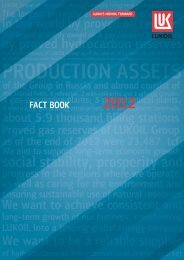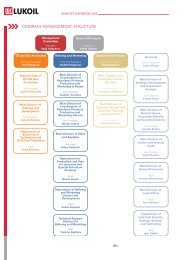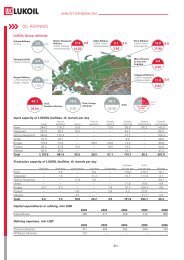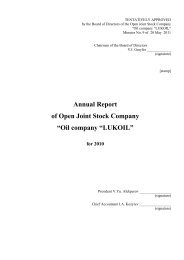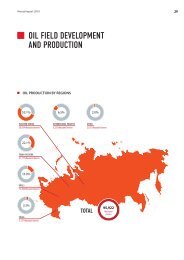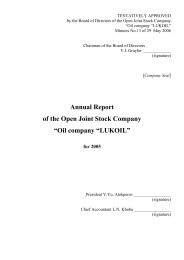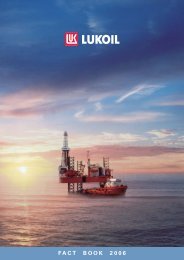ANNUAL REPORT 2005 - Lukoil
ANNUAL REPORT 2005 - Lukoil
ANNUAL REPORT 2005 - Lukoil
Create successful ePaper yourself
Turn your PDF publications into a flip-book with our unique Google optimized e-Paper software.
If borrowings are repurchased or settled before maturity, any difference between the amount paid and the carrying amount<br />
is recognized in the consolidated statement of income in the period in which the repurchase or settlement occurs.<br />
Pension benefits<br />
The expected costs in respect of pension obligations of Group companies are determined by an independent actuary.<br />
Obligations in respect of each employee are accrued over the reporting periods during which the employee renders<br />
service in the Group.<br />
Treasury stock<br />
Purchases by Group companies of the Company's outstanding stock are recorded at cost and classified as treasury stock<br />
within Stockholders' equity. Shares shown as Authorized and Issued include treasury stock. Shares shown as<br />
Outstanding do not include treasury stock.<br />
Earnings per share<br />
Basic earnings per share is computed by dividing net income available to common stockholders by the weighted-average<br />
number of shares of common stock outstanding during the reporting period. A calculation is carried out to establish<br />
if there is potential dilution in earnings per share if convertible securities were to be converted into shares of common<br />
stock or contracts to issue shares of common stock were to be exercised. If there is such dilution, diluted earnings per<br />
share is presented.<br />
CONSOLIDATED FINANCIAL STATEMENTS<br />
Contingencies<br />
Certain conditions may exist as of the balance sheet date, which may result in losses to the Group but the impact of<br />
which will only be resolved when one or more future events occur or fail to occur.<br />
If a Group company's assessment of a contingency indicates that it is probable that a material loss has been incurred<br />
and the amount of the liability can be estimated, then the estimated liability is accrued and charged to the consolidated<br />
statement of income. If the assessment indicates that a potentially material loss is not probable, but is reasonably<br />
possible, or is probable, but cannot be estimated, then the nature of the contingent liability, together with an estimate of<br />
the range of possible loss, is disclosed in the notes to the consolidated financial statements. Loss contingencies considered<br />
remote or related to unasserted claims are generally not disclosed unless they involve guarantees, in which case<br />
the nature of the guarantee is disclosed.<br />
Environmental expenditures<br />
Estimated losses from environmental remediation obligations are generally recognized no later than completion of<br />
remedial feasibility studies. Group companies accrue for losses associated with environmental remediation obligations<br />
when such losses are probable and reasonably estimable. Such accruals are adjusted as further information becomes<br />
available or circumstances change. Costs of expected future expenditures for environmental remediation obligations are<br />
not discounted to their present value.<br />
Use of derivative instruments<br />
The Group's derivative activity is limited to certain petroleum products marketing and trading outside of its physical<br />
crude oil and petroleum products businesses and hedging of commodity price risks. Currently this activity involves<br />
the use of futures and swaps contracts together with purchase and sale contracts that qualify as derivative instruments.<br />
The Group accounts for these activities under the mark-to-market methodology in which the derivatives are<br />
revalued each accounting period. Resulting realized and unrealized gains or losses are presented in the consolidated<br />
statement of income on a net basis. Unrealized gains and losses are carried as assets or liabilities on the consolidated<br />
balance sheet.<br />
Recent accounting pronouncements<br />
In December 2004, the FASB issued SFAS No. 123(R) "Share-Based Payment", which revises SFAS No. 123 and supersedes<br />
Accounting Principles Board (APB) Opinion No. 25 regarding stock-based employee compensation plans. SFAS No.<br />
123(R) requires all share-based payments to employees, including grants of employee stock options, to be valued at fair<br />
value on the date of grant, and to be expensed over the applicable vesting period. The Group will adopt the provisions of<br />
SFAS No. 123(R) in the first quarter 2006 and is currently assessing the effect of adoption.<br />
In April <strong>2005</strong>, the FASB staff issued FASB Staff Position ("FSP") No. FAS 19-1 "Accounting for Suspended Well Costs".<br />
FSP No. 19-1 amends SFAS No. 19 "Financial Accounting and Reporting by Oil and Gas Producing Companies" to revise<br />
the criteria for continued capitalization of costs in relation to exploratory wells and exploratory-type stratigraphic wells.<br />
As amended, SFAS No. 19 allows continued capitalization of such costs for more than one year, provided (a) the well has<br />
143



